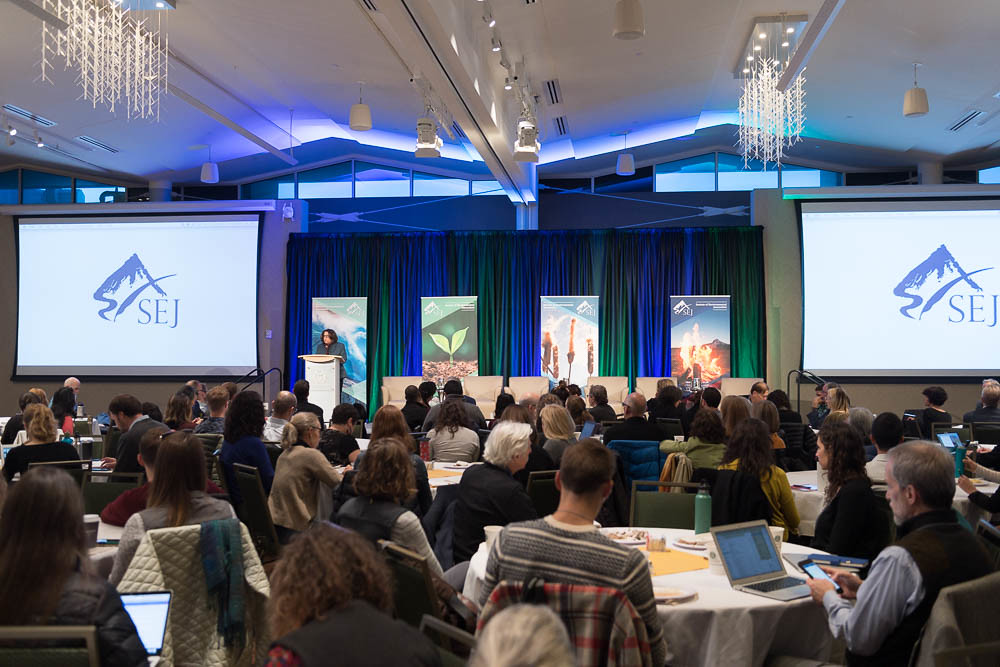Editor’s note: These remarks were delivered by Colorado State University President Joyce McConnell on Friday, Oct. 11, before the opening plenary at the annual conference of the Society of Environmental Journalists.

Good morning, everyone, and welcome to Colorado State University! I know that many of you have actually been here on campus for several days, but I nonetheless am honored to welcome you here today.
There is nothing more daunting than giving a speech to a room full of professional communicators. And those of you who were here for dinner the other night have already heard from some of our most gifted communicators: extraordinary researchers, poets, essayists, and activists.
So forgive me for calling upon someone else’s words here for a moment. They are a call to action that speaks to the work you all do.
“We urgently need an end to these false assurances, to the sugar coating of unpalatable facts. It is the public that is being asked to assume the risks. The public must decide whether it wishes to continue on the present road, and it can do so only when in full possession of the facts.”
Some of you may recognize this exhortation, written by Rachel Carson in Silent Spring nearly 60 years ago. I suspect that all of you agree with her insistence. Putting an end to false assurances and providing facts instead is what all of you do in your work.
I can imagine that this work feels disheartening at times, and not only because Carson’s words are still relevant more than a half century after she wrote them. I am here to assure you that we at CSU are incredibly grateful to you for your commitment to telling the urgent, sometimes “unpalatable” truth about our environment.
And as I hope you have already learned in hearing directly from some of our researchers, we are more than grateful. We share your commitment, and we are invested every day in research that we are eager to share with you — so you can share it with the world. Our faculty, staff, and students — both graduate and undergraduate — are probing environmental issues in fields as diverse as atmospheric science, anthropology, energy production, and biology. We are generating information that needs urgently to be shared, whether it is diagnostic, predictive or prescriptive. We are uncovering problems every day — as you all are — but like you we are also passionately committed to problem-solving, to innovations and ideas that can offer all of us hope moving forward.
I also want to tell you that your work is deeply appreciated by our students. They are acutely aware of how rapidly our world is changing and how many of those changes will be their inheritance and their responsibility.
Some of our students are also actively geeking out because you are here. Earlier this week, I got to sit down with leaders from our various student media outlets — TV, radio, magazine, and newspaper. When this conference came up, several of these young journalists just lit up with excitement. They are here today — or, if they couldn’t quite get here this early (remember college?) — they will be here later. And they want to join you in your work. I hope you take pride in knowing that you are inspiring young people to take on the challenges you face, of communicating difficult but incredibly important information to and about our world. I also hope that if one of them sidles up and asks you for an autograph that you’ll oblige.
Finally, I’d like to end on a personal note and tell you all that throughout my life I have found joy in the natural world. Sometimes it has offered peace and solace, sometimes excitement and energy. I believe that the intimate human experience of our environment is so important — and it too is at risk. In 1962, Rachel Carson wrote that, “Those who contemplate the beauty of the earth find reserves of strength that will endure as long as life lasts. There is something infinitely healing in the repeated refrains of nature – the assurance that dawn comes after night, and spring after winter.”
We all need that healing that nature can offer, but our world needs healing too. Thank you all for carrying that message. It is difficult and it is necessary, and we beg you not to give up! We at CSU will never give up. That’s just not who we are. I hope you all find hope and strength in our commitment and in being with your colleagues here today.